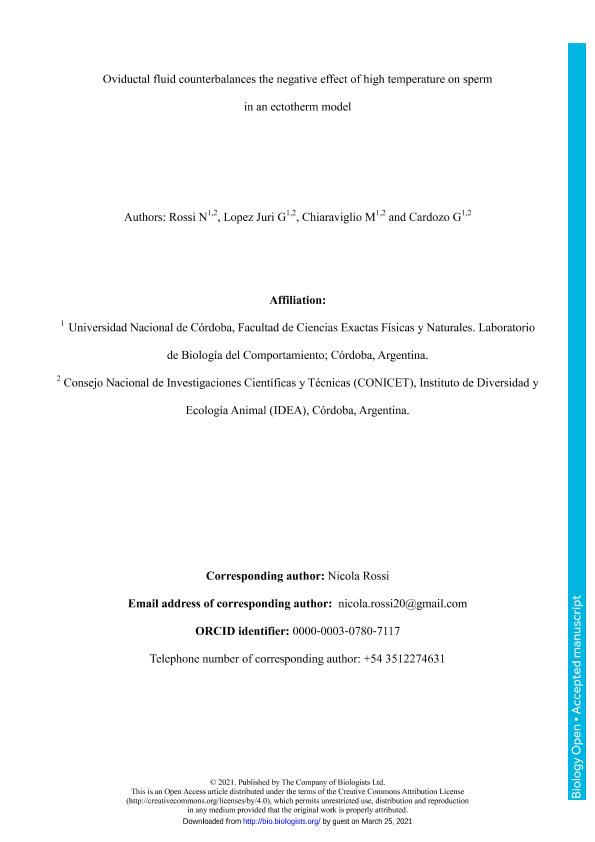Mostrar el registro sencillo del ítem
dc.contributor.author
Rossi, Nicola

dc.contributor.author
López Juri, Guadalupe

dc.contributor.author
Chiaraviglio, Margarita

dc.contributor.author
Cardozo Milanesio, Gabriela Alejandra

dc.date.available
2022-09-23T03:10:41Z
dc.date.issued
2021-04-15
dc.identifier.citation
Rossi, Nicola; López Juri, Guadalupe; Chiaraviglio, Margarita; Cardozo Milanesio, Gabriela Alejandra; Oviductal fluid counterbalances the negative effect of high temperature on sperm in an ectotherm model; Company of Biologists Ltd; Biology Open; 10; 4; 15-4-2021; 1-25
dc.identifier.issn
2046-6390
dc.identifier.uri
http://hdl.handle.net/11336/170085
dc.description.abstract
Global warming is affecting biodiversity; however, the extent to which animal reproductive processes respond to predicted temperature increments remains largely unexplored. The thermal environment has a pronounced impact on metabolic rates of ectotherms; therefore, an interesting question to assess is whether temperature increase might affect specific reproductive mechanisms like sperm performance in ectotherms.Moreover, inmany species, oviductal fluid (OF) is known to regulate and maintain sperm quality; however, the role of OF in relation to the effects of high temperature on sperm remains unclear. Our aim was to experimentally test the effect of increased temperature on sperm velocity, swimming path and percentage ofmotility in neutral conditions at ejaculation (without OF) and in female's reproductive tract fluid (with OF), in a social ectotherm lizard model, Tropidurus spinulosus, which has specific thermal requirements for reproduction. Our results suggest that a rising temperature associated with global warming (+4 C) affects negatively sperm dynamics and survival. However, OF ameliorated the harmful effects of high temperature. This is an important point, as this study is the first to have tested the role of OF in preserving spermfroma warmer pre-fertilization environment. These results contribute to our understanding of how thermal environment changes might affect postcopulatory reproductive mechanisms.
dc.format
application/pdf
dc.language.iso
eng
dc.publisher
Company of Biologists Ltd
dc.rights
info:eu-repo/semantics/openAccess
dc.rights.uri
https://creativecommons.org/licenses/by-nc-sa/2.5/ar/
dc.subject
GLOBAL WARMING
dc.subject
OVIDUCTAL FLUID
dc.subject
SPERM DYNAMIC
dc.subject
SPERM MOTILITY
dc.subject
TEMPERATURE
dc.subject.classification
Biología Reproductiva

dc.subject.classification
Ciencias Biológicas

dc.subject.classification
CIENCIAS NATURALES Y EXACTAS

dc.title
Oviductal fluid counterbalances the negative effect of high temperature on sperm in an ectotherm model
dc.type
info:eu-repo/semantics/article
dc.type
info:ar-repo/semantics/artículo
dc.type
info:eu-repo/semantics/publishedVersion
dc.date.updated
2022-09-05T17:34:38Z
dc.journal.volume
10
dc.journal.number
4
dc.journal.pagination
1-25
dc.journal.pais
Reino Unido

dc.description.fil
Fil: Rossi, Nicola. Consejo Nacional de Investigaciones Científicas y Técnicas. Centro Científico Tecnológico Conicet - Córdoba. Instituto de Diversidad y Ecología Animal. Universidad Nacional de Córdoba. Facultad de Ciencias Exactas Físicas y Naturales. Instituto de Diversidad y Ecología Animal; Argentina
dc.description.fil
Fil: López Juri, Guadalupe. Consejo Nacional de Investigaciones Científicas y Técnicas. Centro Científico Tecnológico Conicet - Córdoba. Instituto de Diversidad y Ecología Animal. Universidad Nacional de Córdoba. Facultad de Ciencias Exactas Físicas y Naturales. Instituto de Diversidad y Ecología Animal; Argentina
dc.description.fil
Fil: Chiaraviglio, Margarita. Consejo Nacional de Investigaciones Científicas y Técnicas. Centro Científico Tecnológico Conicet - Córdoba. Instituto de Diversidad y Ecología Animal. Universidad Nacional de Córdoba. Facultad de Ciencias Exactas Físicas y Naturales. Instituto de Diversidad y Ecología Animal; Argentina
dc.description.fil
Fil: Cardozo Milanesio, Gabriela Alejandra. Consejo Nacional de Investigaciones Científicas y Técnicas. Centro Científico Tecnológico Conicet - Córdoba. Instituto de Diversidad y Ecología Animal. Universidad Nacional de Córdoba. Facultad de Ciencias Exactas Físicas y Naturales. Instituto de Diversidad y Ecología Animal; Argentina
dc.journal.title
Biology Open
dc.relation.alternativeid
info:eu-repo/semantics/altIdentifier/url/http://bio.biologists.org/lookup/doi/10.1242/bio.058593
dc.relation.alternativeid
info:eu-repo/semantics/altIdentifier/doi/http://dx.doi.org/10.1242/bio.058593
Archivos asociados
